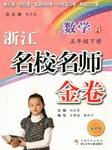题目内容
She is writing a letter to a friend of hers, ___________ him to attend the meeting.
A. having invited B. inviting C. to invite D. invited
B

 浙江名校名师金卷系列答案
浙江名校名师金卷系列答案Miss Li ___ as a secretary for five years in the company, and now she is general manager of it.
| A.has served | B.had served | C.served | D.serves |
Q My daughter is a junior in high school and has been on an individualized education program since fourth grade. She plans to go to college and intends to finish with a master’s degree. Her performance is fairly good, but test scores are very low. She has held many leadership and volunteer positions. We have been advised to have her write an essay about how her learning disability is a barrier that she has overcome. Will that help or hurt her chances for admission?
—Deborah
A First let me answer the question on low standardized test scores (ACT/ SAT). There are hundreds of colleges that are “test optional” which means students can choose not to release their test scores in the application process. Admission decisions at these colleges for students who do not submit their test scores are made based on other factors. A list of test optional colleges can be found at fairtest.org. It is important, however, to make sure that the college is the right fit academically regardless of the test optional policy.
You also asked if your daughter should write about her disability and if this would hurt her chances of being admitted. Please know that colleges do not deny admission based on disability. “Disclosing” a learning disability in a personal statement within the college application can certainly help. By writing a personal statement, students can potentially demonstrate, for example, their understanding of the challenge they face. They might also demonstrate an improved grade trend in that subject area, and show interest in more complex courses in spite of this disability. More importantly, a student disclosure can show self-confidence, motivation and an understanding of the disability.
—Ms. Kravis
【小题1】What do we know about Deborah’s daughter?
| A.She is applying for a master’s degree. |
| B.She is very active in her high school. |
| C.Her disability prevents her studying well. |
| D.She has difficulty overcoming her learning disability. |
| A.Keep them secret | B.Explain the reasons |
| C.Stress other aspects | D.Work hard to improve |
| A.Supportive | B.Opposed | C.Doubtful | D.Unconcerned |
| A.an editor | B.a school leader |
| C.a psychological | D.an educational expert |